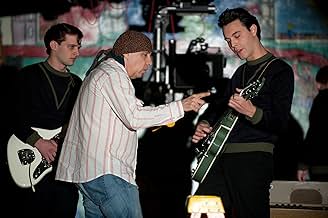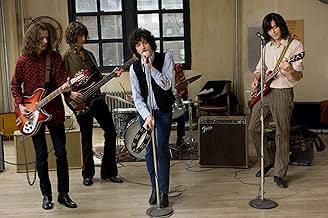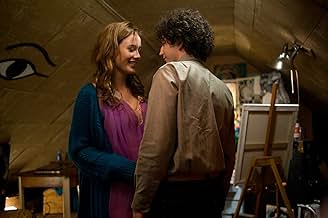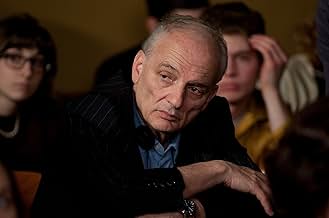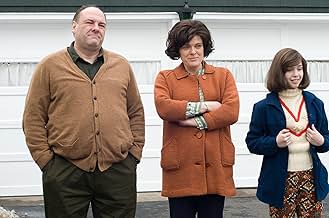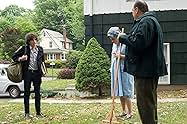IMDb RATING
6.0/10
5.1K
YOUR RATING
Set in suburban New Jersey in the 1960s, a group of friends form a rock band and try to make it big.Set in suburban New Jersey in the 1960s, a group of friends form a rock band and try to make it big.Set in suburban New Jersey in the 1960s, a group of friends form a rock band and try to make it big.
- Awards
- 3 wins & 3 nominations total
Christopher Bannow
- Dave Smith
- (as Chris Bannow)
- Director
- Writer
- All cast & crew
- Production, box office & more at IMDbPro
Featured reviews
David Chase's "Not Fade Away" looks at what it was like to come of age in the '60s. The main focus is a New Jersey teenager who decides to join a band, but there are clear signs of everything that was going on: the Vietnam War, the generation gap, racial tensions, and Dean Martin's mean-spirited comment about the Beatles. Contrary to the previous reviewer, I would say that this movie is better than "Almost Famous". The latter was too fluffy and came across as a sanitized look at its era. This one is very upfront about what sorts of things happened (including some very tense scenes). And the final line poses a good question about how we as Americans want to be known to the world. Can we eventually look to our best qualities to do what's right?
Anyway, this is a good movie. It's got great music and brings up some important points. I recommend it.
Anyway, this is a good movie. It's got great music and brings up some important points. I recommend it.
David Chase's earnest mix of rock 'n roll, young love and family drama is overlong and sloppy, aspiring to be a defining examination of the Sixties but rendered trite by trudging out references to every historic moment (in this, it's similar to "Lee Daniels' The Butler") and wallowing in misguided pronouncements about the Vietnam War, capitalism and rock's purity; the intent is to advance the father-son conflict between lead John Magaro and a wasted James Gandolfini. (In fact, Chase unintentionally portrays rock music as a negative force, divisive enough to destroy families.) Chase's strength as the creator of "The Sopranos" was in his carefully plotted backstory that forced the viewer to pay close attention upfront; here, he employs a similar approach, but without the expanse a mini-series affords the result is disjointed and incomplete: all of the stories he introduces are either left unsatisfactorily unresolved or spontaneously concluded. It doesn't help that his characters are inherently unlikable (Magaro is a good example), mere caricatures (co-stars Jack Huston and Will Brill) or blanks (love interest Bella Heathcote). The film's sole asset is Steven Van Zandt's musical curation, though he eschews the deeper tracks in favor of songs even the casual fan will recognize.
The Sopranos' creator David Chase's directorial debut, "Not Fade Away", is, at its core, a sad movie, masked by the comedy and music that barricade my empathy. The fictional story of a 1960s teenage drummer (John Magaro) who creates a rock band with a few of his friends, "Not Fade Away" is a very character driven film, focusing primarily on the social life of the protagonist, specifically his relationship with his girlfriend (Bella Heathcorte), his band mates, and his family. I won't spoil the plot, but it is a coming-of-age tale, not as much about learning and growing as it is about doing and living. James Gandolfini is an on screen pleasure as the main character's father, while the rest of the cast, mostly lesser known actors, gratifyingly embody the 1960s rock and roll personality.
Gloriously filmed by Chase's cinematographer Eigil Bryld, the film succeeds in emitting a rock and roll cluttered vibe when the music is playing, contrasted by a dark, Godfatheresque undertone that is signature of David Chase during more dramatic scenes. While the art direction and costume design were spot on, in the end it was the music that was transporting me through time. Repeatedly watching, with the characters, The Beatles, The Rolling Stones, and Buddy Holly perform on a small black and white TV, I was sent back into the age of drugs, sex, and rock and roll. The band's original songs were probably the highlight of the film. Under the supervision of Steve Van Zandt, the music department took advantage of the actors' talented musical backgrounds and were able to conjure up some extremely enjoyable tracks that very well could've been written during the era.
My main problem with the film is the fact that it is littered with unnecessary scenes, scenes that are probably meant to indicate character development, but ultimately convey little to nothing. It also fails to establish Heathcote, the supporting actress, as an interesting or particularly likable character. Not much is ever learned about her through the course of the film while notably less significant characters remain better developed and ultimately more interesting.
When walking into the theater at the New York Film Festival, I thought I was in for another "Almost Famous". What I got was a very different movie. "Not Fade Away" is a simple picture. With a basic plot structure and relatable characters, the film is practically spoon-fed to its audiences. It is the end of the film, the final scenes, that sum up not only the movie, but the era. You must think before you proclaim a lack of closure, consider the times and the lifestyle. Rock spawned from the blues and, in the sad actuality of this movie, can't ever separate from its source. Success is 10% inspiration and 90% perspiration and in the end we often can't keep up. I recommend this vicarious joyride to all music, drama, and comedy movie lovers, as well as anyone who is looking for a party, a party that is shut down by reality. 8/10 stars.
Gloriously filmed by Chase's cinematographer Eigil Bryld, the film succeeds in emitting a rock and roll cluttered vibe when the music is playing, contrasted by a dark, Godfatheresque undertone that is signature of David Chase during more dramatic scenes. While the art direction and costume design were spot on, in the end it was the music that was transporting me through time. Repeatedly watching, with the characters, The Beatles, The Rolling Stones, and Buddy Holly perform on a small black and white TV, I was sent back into the age of drugs, sex, and rock and roll. The band's original songs were probably the highlight of the film. Under the supervision of Steve Van Zandt, the music department took advantage of the actors' talented musical backgrounds and were able to conjure up some extremely enjoyable tracks that very well could've been written during the era.
My main problem with the film is the fact that it is littered with unnecessary scenes, scenes that are probably meant to indicate character development, but ultimately convey little to nothing. It also fails to establish Heathcote, the supporting actress, as an interesting or particularly likable character. Not much is ever learned about her through the course of the film while notably less significant characters remain better developed and ultimately more interesting.
When walking into the theater at the New York Film Festival, I thought I was in for another "Almost Famous". What I got was a very different movie. "Not Fade Away" is a simple picture. With a basic plot structure and relatable characters, the film is practically spoon-fed to its audiences. It is the end of the film, the final scenes, that sum up not only the movie, but the era. You must think before you proclaim a lack of closure, consider the times and the lifestyle. Rock spawned from the blues and, in the sad actuality of this movie, can't ever separate from its source. Success is 10% inspiration and 90% perspiration and in the end we often can't keep up. I recommend this vicarious joyride to all music, drama, and comedy movie lovers, as well as anyone who is looking for a party, a party that is shut down by reality. 8/10 stars.
Reading some of the other reviews I can somewhat see positive interpretations of this movie: life as a young person in the 60s was not cohesive or predictable thus it is fitting for this film to be "confused". The problem is that the more or less random snapshots of the particular life we are witnessing illustrate the decade in ways we already understand: I like the Beatles, I am sad and mad when MLK is shot, I don't want to go to 'Nam.
Without the support of a plot or structured character development, one can anticipate the emptiness of it all. Too many threads are planted at once and they all die in strangled, choppy mess. Finally, individual scenes are executed in a way that is flowery, verbose, and predictable, which leaves each self-indulgent attempt at emotion-evoking very obvious.
Nostalgia is strong, and a few shivers-down-the-spine moments will no doubt come, which makes it easy to overrate this film. However those moments happen *despite* the film: cool history and good music are powerful things.
Without the support of a plot or structured character development, one can anticipate the emptiness of it all. Too many threads are planted at once and they all die in strangled, choppy mess. Finally, individual scenes are executed in a way that is flowery, verbose, and predictable, which leaves each self-indulgent attempt at emotion-evoking very obvious.
Nostalgia is strong, and a few shivers-down-the-spine moments will no doubt come, which makes it easy to overrate this film. However those moments happen *despite* the film: cool history and good music are powerful things.
David Chase's anticipated Not Fade Away not only jumbles itself into an indulgent story, constantly keeping the audience at an arm's length but it's overly stretched and uneven not utilizing the strong talents in the film like James Gandolfini, Jack Huston, and John Magaro. A natural comparison to Almost Famous (2000), the film doesn't hold a candle to Cameron Crowe's homage to music. Showcasing outstanding music of the 1960′s and 1970′s, Chase manages to capture moments of the young adolescent mind longing to be more. Lead Magaro delivers a character transformation of mind and body, a turn that elevates the film considerably. The great Jack Huston, an actor that will likely be one of the biggest things in Hollywood any minute now, delivers an aggressive supporting turn reminiscent of Channing Tatum's work in A Guide to Recognizing Your Saints (2006). Bella Heathcote shows tenderness and promise but undervalued and virtually unused. James Gandolfini, stands out with charisma and garners much of the big laughs. A great character actor like Gandolfini should be given room to move. The film ultimately fails because it never feels like Chase knows his film or where he wants it to go. The last twenty minutes feel unneeded, unearned, and thrown together for an "artistic" catalyst with no emotional or technical effect whatsoever. A large disappointment.
Storyline
Did you know
- TriviaMost feature films slot 1-2 percent of production costs for the music budget, but in "Fade', music supervisor Steven Van Zandt, had about 10% of the $20-million-plus budget or at least $2 million.
- GoofsNobody said "elementary school" in North Jersey, at least not those days. Grades 1-6 (or 1-8 if you went to Catholic school) was called "grammar school."
- ConnectionsFeatures South Pacific (1958)
- SoundtracksPeppermint Twist
Written by Joey Dee (as Joseph Di Nicola) and Henry Glover
Performed by Joey Dee and The Starliters
Courtesy of Rhino Entertainment Company
By arrangement with Warner Music Group Film & TV Licensing
- How long is Not Fade Away?Powered by Alexa
Details
Box office
- Budget
- $20,000,000 (estimated)
- Gross US & Canada
- $610,792
- Opening weekend US & Canada
- $19,182
- Dec 23, 2012
- Gross worldwide
- $636,399
- Runtime1 hour 52 minutes
- Color
- Sound mix
- Aspect ratio
- 1.85 : 1
Contribute to this page
Suggest an edit or add missing content





